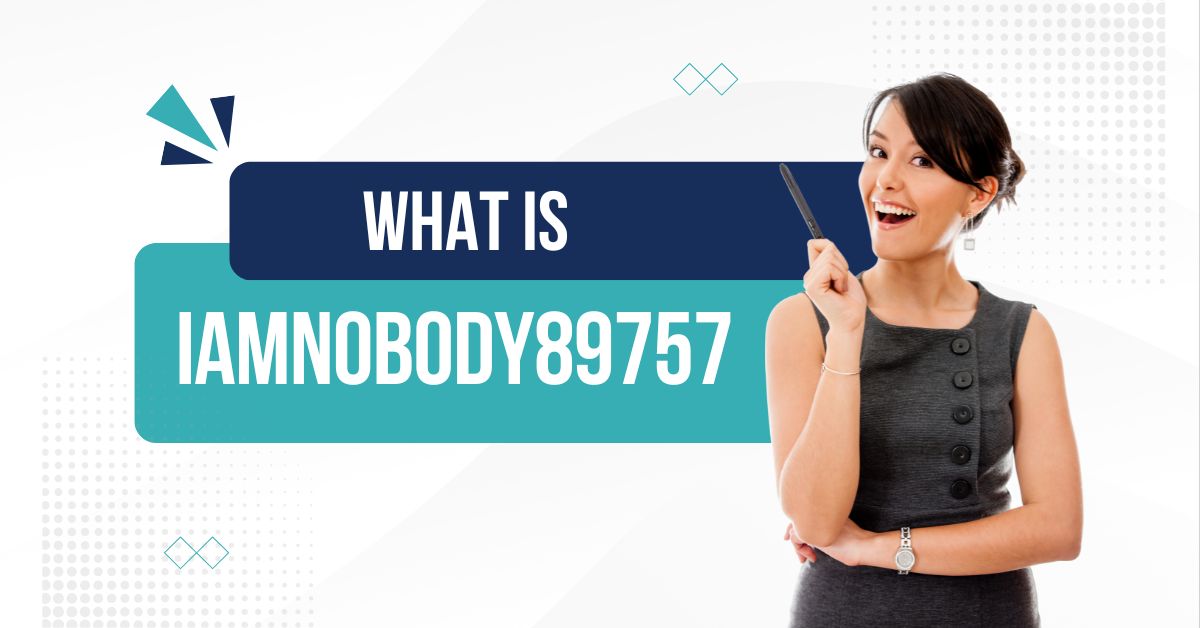Have you ever come across the username “iamnobody89757” and wondered who it could be? This mysterious figure, like many others on the internet, epitomizes the concept of online anonymity. In a world where our digital footprints can be traced and tracked, the allure of staying hidden behind a pseudonym has never been stronger. This article delves into the enigma of “iamnobody89757” and explores the broader implications of online anonymity.
The Rise of Online Anonymity
Online anonymity has its roots in the early days of the internet. Back then, the digital landscape was akin to the Wild West, with little regulation and endless possibilities for self-expression. People adopted pseudonyms to explore their identities, share controversial opinions, or simply engage in activities they wouldn’t want associated with their real names. Over time, this practice has evolved, becoming a cornerstone of internet culture.
Who is “iamnobody89757”?
The persona “iamnobody89757” represents a typical case of online anonymity. While the true identity of this individual remains unknown, various speculations and theories abound. Some believe “iamnobody89757” to be a whistleblower, others think they might be an artist seeking freedom from societal judgment. Regardless of who they are, their impact on the online community is undeniable, sparking conversations about the benefits and drawbacks of anonymity.
Psychology Behind Online Anonymity
What drives someone to become “iamnobody89757”? The allure of anonymity lies in the freedom it offers. Psychologically, being anonymous allows individuals to express themselves without fear of retribution or judgment. Studies have shown that anonymity can lead to more honest and open communication. However, it also comes with risks, such as the potential for irresponsible behavior and the spread of harmful content.
Advantages of Online Anonymity
Online anonymity offers numerous benefits. It provides a safe space for people to share their thoughts without fear of personal attacks. For those living in repressive regimes, it can be a lifeline for free expression. Anonymity also helps prevent bias and discrimination, allowing ideas to be judged on their merit rather than the identity of the person presenting them.
Disadvantages of Online Anonymity
However, there are significant downsides to consider. Anonymity can foster cyberbullying, harassment, and the spread of misinformation. Without accountability, some individuals feel emboldened to engage in negative behaviors that they wouldn’t exhibit in real life. This lack of accountability can erode trust and create toxic online environments.
Online Anonymity and Legal Implications
The legal landscape surrounding online anonymity is complex. Various laws and regulations aim to balance the right to privacy with the need for accountability. Notable legal cases have highlighted the challenges in enforcing these laws, particularly when dealing with anonymous entities. As technology evolves, so too do the legal frameworks, striving to keep pace with the changing dynamics of online interactions.
Technological Aspects of Online Anonymity
Maintaining anonymity online requires a blend of tools and techniques. VPNs (Virtual Private Networks), Tor (The Onion Router), and encryption methods are popular among those seeking to stay hidden. Each of these tools has its strengths and weaknesses, and navigating them effectively can be challenging. Despite these challenges, technological advancements continue to enhance the ability to remain anonymous.
Ethical Considerations
Anonymity brings with it a host of ethical dilemmas. While it can empower individuals, it also raises questions about responsible behavior. How should anonymous users conduct themselves? What are the community standards? Balancing the right to anonymity with the need for respectful and ethical behavior is a continual challenge for online communities.
The Future of Online Anonymity
The future of online anonymity is a topic of much debate. With advancements in AI and machine learning, the landscape is bound to change. Predictive algorithms and data analytics might make it harder to stay anonymous. However, these same technologies could also offer new ways to protect privacy. Legislative changes are also expected, as governments and organizations strive to adapt to the evolving digital world.
How to Safeguard Your Anonymity Online
If you’re looking to protect your anonymity online, there are several strategies to consider. Using robust passwords, enabling two-factor authentication, and staying informed about the latest privacy tools are essential steps. It’s also important to be aware of common pitfalls, such as sharing too much personal information on social media. For those serious about anonymity, resources like privacy-focused forums and guides can be invaluable.
Case Studies of Notable Anonymous Figures
Beyond “iamnobody89757,” history is replete with notable anonymous figures. From the whistleblower Edward Snowden to the hacktivist collective Anonymous, these individuals and groups have left an indelible mark on society. Their stories offer valuable lessons about the power and perils of anonymity, illustrating both its potential for positive change and its capacity for controversy.
Public Perception of Online Anonymity
Public perception of online anonymity is mixed. Media portrayals often oscillate between highlighting the dangers and celebrating the freedom it offers. Surveys suggest that while many value their privacy, there’s also significant concern about the misuse of anonymity. Social media plays a crucial role in shaping these perceptions, often amplifying both the benefits and the risks.
Conclusion
In exploring the enigma of “iamnobody89757,” we uncover broader truths about the nature of online anonymity. It’s a double-edged sword, offering unparalleled freedom while posing serious risks. As we navigate this complex landscape, understanding the motivations and implications of anonymity becomes ever more critical. Whether for better or worse, the concept of staying hidden behind a username will continue to shape our digital lives.
FAQs
Why do people choose to remain anonymous online?
People seek online anonymity for various reasons, including the desire for privacy, freedom of expression, and protection from retribution or judgment.
Is online anonymity a right or a privilege?
This is a debated issue. Some argue that it’s a fundamental right tied to freedom of speech, while others see it as a privilege that should be regulated to prevent abuse.
How can online anonymity be abused?
Online anonymity can lead to cyberbullying, harassment, spreading misinformation, and engaging in illegal activities without accountability.
What are the best tools for maintaining anonymity online?
Popular tools include VPNs, Tor, and encryption services. Each offers different levels of protection and has its own set of advantages and challenges.
What does the future hold for online anonymity?
The future of online anonymity is uncertain, with potential changes driven by technological advancements and evolving legal frameworks aimed at balancing privacy and accountability.










